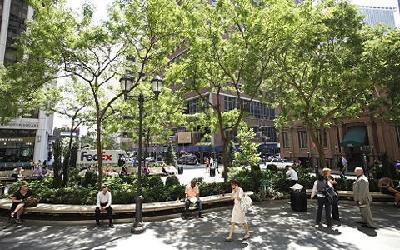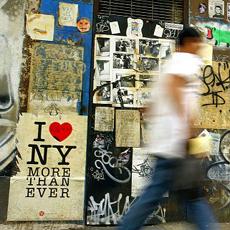
BOB DOUGHTY: Welcome to THIS IS AMERICA in VOA Special English. I'm Bob Doughty.
FAITH LAPIDUS: And I'm Faith Lapidus. Nearly 3,000 people were killed in the attacks against the United States on September 11th, 2001. Early that morning, terrorists hijacked four passenger airplanes. Two planes struck the World Trade Center in New York City. Another hit the Pentagon building, just across the river from Washington, DC. Passengers on the fourth plane are said to have fought the hijackers. Their plane crashed on a field in western Pennsylvania.
The victims were from the United States and many other nations. It was the worst terrorist attack in American history. But for many people, the event does not feel like history. Today, we hear some of the ways the 911 attacks changed lives around the world.
(MUSIC)

BOB DOUGHTY: The attack on the World Trade Center's Twin Towers not only destroyed those buildings, it changed the personality of the surrounding neighborhood. In the past ten years, the area has moved away from its business centered past to a family friendly area now called the Diaper District.
FAITH LAPIDUS: Stephanie Hryckowian is the daughter of a Ukrainian immigrant who owned the Beekman Deli. The family business served office workers from the Twin Towers for 25 years. Then, the 911 attacks changed her life forever. She remembers her reaction to the killing of al-Qaida leader Osama bin Laden.
STEPHANIE HRYCKOWIAN: "When the president said they got Osama, I sat there crying, because I was so happy."
FAITH LAPIDUS: The Beekman Deli went from earning 25,000 dollars a week profit to nothing.
STEPHANIE HRYCKOWIAN: "We were sitting pretty before that [9/11]. After that, it all disappeared."
FAITH LAPIDUS: The delicatessen failed. The place where it once stood is now an automated teller machine for a bank.
BOB DOUGHTY: Nearby is one of the office buildings formerly served by the Beekman Deli. Like many older buildings in Lower Manhattan, its businesses left after the September 11th attacks. It was then developed into housing. Lower Manhattan is now home to 56,000 people. That is more than two times the number it had ten years ago.
Real estate agent Luis Vazquez is among the newcomers.
LUIS VAZQUEZ: "Today, the Financial District has the highest concentration of households with children in the city."
BOB DOUGHTY: So many families, in fact, that The New York Times newspaper has called the area the Diaper District. It is not uncommon to see mothers pushing baby strollers down the side streets.
FAITH LAPIDUS: Jocelyn Zoland is a mother. She saw one of the planes strike the World Trade Center.
JOCELYN ZOLAND: "It's nice to see that in the shadow of that there are all these children and there are all these activities, and it has become a wonderful destination. We'll see if things change though."
FAITH LAPIDUS: Ms. Zoland says that change could include millions of visitors to the area with the completion of a 911 museum at Ground Zero. In addition, tens of thousands of office workers will occupy Freedom Tower, a skyscraper being built to replace the Twin Towers.
BOB DOUGHTY: But the Beekman Deli is gone. Many other businesses are still closed. Stephanie Hryckowian says what did not disappear was the Deli's responsibility to pay taxes and make rent payments through 2004. That cost her 500,000 dollars in savings. She now rents out her home and lives with family members.
STEPHANIE HRYCKOWIAN: "We have no health insurance. We have no 401K. We have no retirement fund. We have nothing after 9/11."
BOB DOUGHTY: Lower Manhattan has been rebuilding from what happened ten years ago. But Stephanie Hryckowian is unemployed and still struggling to deal with the effects of the attacks.
(MUSIC)
FAITH LAPIDUS: The United States answered the September 11th attacks with a war against terror. First it sent troops to Afghanistan after the country's Taliban government refused to expel al-Qaida leaders. Then, United States forces went to Iraq. The American-led invasion led to the overthrow of Iraqi leader Saddam Hussein.
One of the unplanned results of his ouster is a generation of Iraqi children who have lived through eight years of unrest.
BOB DOUGHTY: Iraqi friends Mohammed Ahmed and Sadiq Ali have always been together. They grew up on the same street. They walked to school together and dreamed about becoming soccer stars.
The two friends were also together four years ago, playing near Mohammed's home, when a rocket exploded next to them. Their lives changed forever. Ali lost his right leg, Ahmed, his left. A third friend died.
BOB DOUGHTY: The two friends are part of a generation of Iraqi children scarred by the violence that followed the ouster of Saddam Hussein. Thousands of Iraqis suffered injuries over the years because of fighting between competing groups, criminal activity and a nationalist rebellion.
FAITH LAPIDUS: The United Nations says up to 800,000 Iraqi children have lost at least one parent in the violence. Social services are uncommon in Iraq. Parents, officials and non-profit groups say the government is unable to provide many of these children with shelter, medical care and emotional support. Surgical operations on trauma patients are free, but Iraqis have to pay for nearly all other medical services.
Throughout their pain, Mohammed and Sadiq have never left each other's side. Wherever their future lies, they will go there together, on donated crutches and a yellow prosthetic leg.
(MUSIC)
BOB DOUGHTY: America's collective sense of security changed after the 911 attacks. Many Americans now feel vulnerable, not only to more attacks but also to new measures designed to prevent terrorism.
Travelers have faced increased security at airports over the past ten years. Some measures are still being questioned, but traveler Bob Dubois believes they are necessary.
BOB DUBOIS: "I think it's something that we need in this day and economy as it is right now with what's going on. You never know what's going to happen and the people that are out there, and I think that we need to do this."
FAITH LAPIDUS: Oscar Del Castillo agrees the new measures are needed, but he says...
OSCAR DEL CASTILLO: "A few procedures, I'm not entirely pleased with, such as the full body scans. However, I understand their importance."
FAITH LAPIDUS: Ameena Mirza Qazi is a lawyer with the Council on American-Islamic Relations, in Los Angeles. She says that the measures are directed at observant Muslims.
AMEENA MIRZA QAZI: "When I travel, I get pulled over almost every single time I go through security for extra pat-downs because of my head scarf."
FAITH LAPIDUS: Transportation security officials say they do not target Muslims on purpose. But many Muslims say they suffer discrimination. Last year, a religious center near the city of San Diego faced neighborhood protests over its plans to expand.
(SOUND)
BOB DOUGHTY: Civil rights activists took legal action against the Federal Bureau of Investigation earlier this year for reportedly using informants to monitor Muslims. FBI officials would not comment. But officials say they take action only when they suspect criminal behavior.
Ahilan Arulanantham of the American Civil Liberties Union says the FBI's methods are too invasive. He says the nation's founding fathers wanted to guarantee basic rights.
AHILAN ARULANANTHAM: "And the rules that they created were designed to protect us and strike that balance even during that time."
BOB DOUGHTY: Steven Martinez works for the FBI office in Los Angeles. He says the United States still supports the goal of an open society, but the risk of terrorism is real.
STEVEN MARTINEZ: "If we want to maintain that sense of freedom, we're always going to have vulnerabilities in places where people gather – theme parks, movie theaters, shopping malls. Those present opportunities for our adversaries and those are very, very difficult to secure."
FAITH LAPIDUS: Security expert Erroll Southers of the University of Southern California says Americans need to face, and control, the new risks.
ERROLL SOUTHERS: "The same as they're told about the challenges we have with earthquakes, fires, floods, hurricanes. This is a disaster of a man-enabled paradigm, so we should be educating them on what the real threats are. And then second, we should make sure they understand how then can help."
FAITH LAPIDUS: Mr. Southers says information from the public is needed to stop terrorists, but effective security measures still must respect the rights of Americans. Finding the right balance is the hard part.
(MUSIC)
BOB DOUGHTY: Our program was written and produced by Brianna Blake, with reporting by Peter Fedynsky, Ayman Oghanna and Mike O'Sullivan. I'm Bob Doughty.
FAITH LAPIDUS: And I'm Faith Lapidus. You can find transcripts and MP3s of our programs and learn English at voaspecialenglish.com. Join us again next week for THIS IS AMERICA in VOA Special English.
prosthetic: 假体的
(来源:VOA 编辑:崔旭燕)
